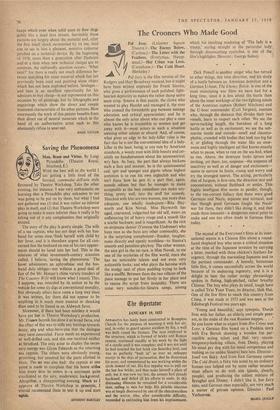The Crooners Who Made Good
Pal Joey. (Leicester Square
Theatre.)—The Enemy Below. (Carlton.)—The Letter with the Feathers. (Everyman, Hamp- stead.)—Her Crime was Love. (Cinephone.)—The Cold Heart. (Berkeley.) Pal Joey is the film version of the Rodgers and Hart Broadway musical, but it might have been written expressly for Frank Sinatra, who gives a performance of such polished, light- hearted depravity as makes the rather damp satire seem crisp. Sinatra is that puzzle, the clown who wanted to play Hamlet and managed it, the man who crossed the formidable gap between teenage adoration and critical appreciation; and he is almost the only actor about who can play a man who knows he is irresistible to women and get away with it—most actors in such a situation seeming either odious or absurd. And, of course, what gives an edge to his lady-killer roles is the fact that he is not the conventional idea of a lady- killer in the least, being, at any rate by American standards, a weedy man with little beauty and cer- tainly no handsomeness about his asymmetrical, wry face. As Joey, the part that always beckons such a face and manner, he is the quintessential cad, spiv and sponger and gigolo whose highest ambition is to run his own nightclub and who isn't fussy how he gets it; a part that, again, sounds odious but that he manages to make acceptable as the best comedians can make any- thing, pretty well, into the stuff for comedy. Matched with him are two women, one more than adequate, one wholly inadequate—Rita Hay- worth and Kim Novak. Miss Hayworth has aged, coarsened, vulgarised her old self, wears an unflattering lot of heavy rouge and a mouth like a scarlet hacksaw; and is magnificent. As the rich ex-striptease dancer (Vanessa the Undresser) who buys men as she buys any other commodity, she is the surprising complement—franker, tougher, more directly and openly worthless—to Sinatra's smooth and penniless playboy. The other woman, the nice girl in the rat race, is Miss Novak, to me one of the mysteries of the film world, since she has no noticeable talents and not even very noticeable looks; and who plays the heroine with the stodgy zeal of plum pudding trying to look like a soufflé. Between them the two villains of the piece manage to put her firmly in her place and to rescue the script from insipidity. There are some very suitable-for-Sinatra songs, among which his insulting rendering of 'The lady is a tramp,' staring straight at the particular lady through disconcerting eyelashes, is one of the film's highlights. Director : George Sidney.
* *
Dick Powell is another singer who has turned to other things, this time direction, and his study of a battle between an American destroyer and a German U-boat, The Enemy Below, is one of the most stimulating war films we have had for a long time, since it is less about the battle than about the inner workings of the two fighting minds of the American captain (Robert Mitchum) and the U-boat commander (Curt Jurgens), enemies who, through the distance that divides their two vessels, learn to respect each other. We see the nerve-racking length, the boredom of a long battle as well as its excitement; we see the sub- marine inside and outside—small and claustro- phobic, crowded with bodies that look too big for it, or gliding through the water like an enor- mous and highly intelligent eel that knows exactly when to pause, when to rest on the sea-bed, when to rise. Above, the destroyer looks spruce and inviting, yet there, too, suspense—the suspense of inactivity as well as of danger and excitement— seems to narrow its limits, cramp and worry and try the strongest nerves. The acting, particularly that of Jurgens, is first-rate, the direction taut and concentrated, without flashback or asides. This highly intelligent film seems to pander, though, to the too-current fallacy that there were good Germans and Nazis, separate and inimical, and that though good Germans fought the Nazis' war for them, they didn't like doing it, and that made them innocent—a dangerous moral point to make and one too often made in German films today. * *
The second of the Everyman's films in its inter- national season is a Chinese film about a round- faced shepherd boy who saves a critical situation at the time of the Japanese invasion by carrying a letter, marked with three chicken's feathers for urgency, through the marauding Japanese and to the partisan commander. A homely, humorous little film, it comes successfully across the world because of its endearing ingenuity, and it is a delight to hear the rather stodgy phraseology spoken in fluting, high-pitched, rather breathy Chinese. The boy who plays its small, tough hero is called Ts'ai Yuan Yuan; its director, Shih Hui. One of the few films to reach this country from China, it was made in 1953 and was seen at the Edinburgh Festival two years ago.
`Young and beautiful,' says synopsis, `Dunja lives with her father, an elderly and simple peas- ant, in the midst of the vast Russian steppes. . . So you know what to expect from Her Crime was Love, a German film based on a Pushkin story with Eva Bartok showing a wooden but per- ceptible acting talent and that very uncon- temporary-looking villain, Ivan Desny, playing his usual gay dog with his usual competence and making us (so unlike Sinatra) hate him. Director : Josef von Baky. And from East Germany conies The Cold Heart, a fairy tale acted by an ordinary human cast helped out by some rather amateur stunt effects to do with size (giants, dwarfs, people), and producing the oddest mixture of Breughel and Disney. I didn't like it, but fairy tales, and German ones especially, are very much a matter of private opinion. Director : Paul Verhoeven.
ISABEL QUIGLY






























 Previous page
Previous page